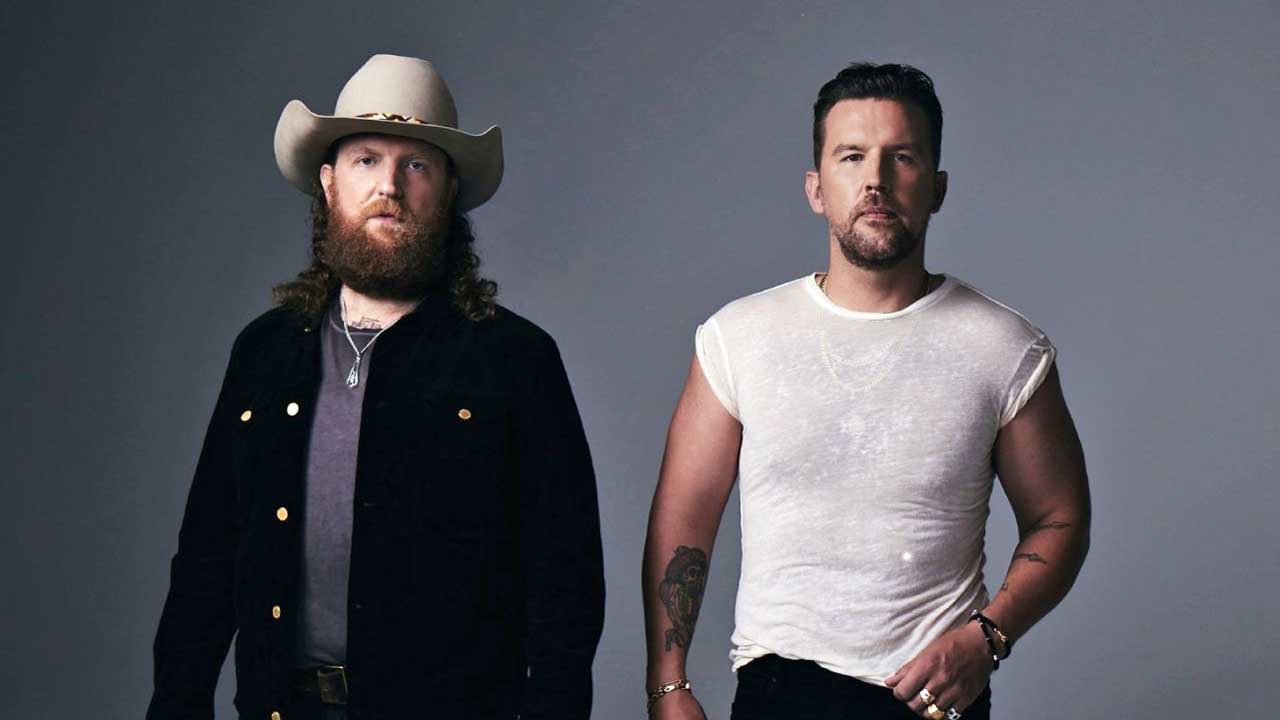“That one says ‘Rebel Without A Clue’.’” John Osborne is offering up his left arm to show a blue-inked phrase from a favourite Tom Petty song. We’re sitting in his mood-lit, vintage gear-jammed home studio in East Nashville, and he and his younger brother TJ, both friendly goliaths in jeans and T-shirts, are giving Classic Rock a quick tour of their respective tattoos.
There are mandalas, Hank Williams, Jimi Hendrix, Black-eyed Susans, the state flower of Maryland, where the duo grew up. Both have “the five hashmark”, which represents all five siblings in their family. TJ’s ‘225’, which many fans have speculated as being “some mystical reference”, is actually a homage to an 80s Buick that their dad drove. But it’s that Petty quote, from Into The Great Wide Open, that resonates the most.
“Rebel without a clue,” John says. “I’ve always thought that was insanely poetic. That’s kind of what we are – rebels against conforming to society and societal standards. And the last few years have very much been about going into a kind of great wide open for us.”
John is referring to “the very personal things” that he and TJ have publicly disclosed about themselves. For John it was a struggle with depression and anxiety that had him considering not only quitting music, but even ending his life. For TJ it was coming out as gay. “Art should reflect life,” John says. “It’s not like we weren’t who we are on earlier records, but we weren’t fully who we are. Now we just feel like we have no limitations.”
“This record was the first time we were able to truly create something without having any filters on,” says TJ.
“This record” is Brothers Osborne, their fourth album, self-titled “because it’s the meeting point between who we’ve become and who we’ve always been,” TJ explains. And it has an exhilarating rush of newfound freedom. The duo have an ideal collaborative partner in producer Mike Elizondo, a Dr. Dre protégé who’s worked with artists including Eminem, Carrie Underwood and Lake Street Dive.
With an array of top Nashville session players on board, and Paul McCartney’s longtime powerhouse drummer Abe Laboriel Jr., they deliver 11 songs’ worth of arena-ready rollicking riffs, modern dance beats (including drum machines) and buoyant shout-along choruses that feel like an all-kinds-of-kinds pep rally. At the heart are John’s down-home, bluesy guitar heroics and TJ’s baritone voice.
The Brothers describe their hybrid-rich sound as “a hundred per cent all over the place” (on the subject of current favourite records, they list everything from JJ Cale and Daryl Scott to AC/DC and Dua Lipa), and that leads to some discussion about what makes something country these days.
“I don’t find it surprising that classic rock publications are looking at country, because it reflects a lot of that sound,” says John. “I mean, Mutt Lange produced Back In Black and then went on to produce Shania Twain. So there’s a lot of overlap.”
“The interesting flip is,” TJsays, “in Nashville, if it gets too rock, then it’s like: ‘Wait, that’s not going to work for country.’ Then we go to the UK, and they say: ‘Well you don’t say country here, it’s rock.’
“In the UK you can actually say ‘c**t’, but you can’t say ‘country’,” John adds with a laugh.

Back home, country music is where the Brothers Osborne sit, although they feel more kinship with fellow outliers like Kacey Musgraves, Ashley McBryde and Jason Isbell. In the world at large in 2023, TJ and John’s recent personal revelations may not seem earth shaking. In Nashville, which can be conservative and harshly reactionary, they are. Around Music City there’s always the worry of the career-halting “Dixie Chicks effect”.
“There’s definitely a fear of putting yourself out there in full light due to running the risk of judgment,” says TJ. “I’d gotten so good at dancing around my sexuality and personal life in interviews, I didn’t realise what a daily weight it had become.”
“For me, with my mental health stuff, I felt like I was always walking along the edge of a cliff,” says John, remembering a scary moment during the making of 2020’s Skeletons, when he felt so paralysed that he couldn’t physically enter the studio.
Keep in mind that the Osbornes were already well established. They’d won five Country Music Association awards for Vocal Duo Of The Year, been nominated for seven Grammys (and won one), had platinum sales, charted with Top 10 hits such as Stay A Little Longer and It Ain’t My Fault, and surpassed two and a half billion streams globally. With a major-label deal, a large team and many on the payroll, the stakes were high.
“We were very lucky to have everyone in our corner – management, label, our band and crew,” John says.
“We’re all like family, and they would go down on a sinking ship with us if it came to that.” TJ adds: “Before I came out, a friend said: ‘Dude, I would be really shocked if any one of those people would prefer you to be unhappy just so they could keep their job.’ And I was like: ‘Boom’, that’s it.’”
Were there reciprocal ‘boom’ moments for the siblings as they shared their situations?
“Well, I knew that John was dealing with some things,” TJ says, “but I didn’t realise the magnitude of it until it reared its head. The beauty is that he was able to get to a place where he could talk freely about it.”
“And I knew about TJ, but it wasn’t my place to ask,” John says.
“When he saw my internet search history, he really knew,” TJ says, and both of them dissolve in deep-chested laughter.
“Seriously, before we got signed I told John that I intend on coming out at some point because I don’t want to live my life closeted,” says TJ. “It took a lot longer than I thought it would. I didn’t want it to seem opportunistic. There are so few things in life that go the way you want them to, but that happened how we wanted it to happen.”
When I mention that the usual country music default go-to in times of stress and uncertainty is God, the brothers look at each other and then say in tandem: “Yeah, we’re definitely not religious.”
“We never went to church as kids,” says John. “And whatever God is, I don’t think it judges everybody. Putting an inner critic in someone and then calling her God is quite cruel.”
TJ: “I like the Ricky Gervais bit where he’s talking about how there are three thousand gods that people pray to and believe in. He’s an atheist, talking to someone who believes in one god, and says: ‘You don’t believe in 2,999 gods, and I don’t believe in just one more.’ That’s so funny.”
If there was any gospel for the Osborne brothers growing up in Deale, a small bluecollar town south of Baltimore, it was one of hard work and ambition. John and TJ, given the same first and middle names but in reverse order (John Thomas, Thomas John), are the sons of musical parents who also run a successful plumbing business. Back then, just beyond the family van, kitted out with gaskets and hoses, there was a shed with a reel-to-reel tape recorder set-up in it.
“Plumbing definitely prepared us to work our asses off,” says TJ. “I’ve crawled under more houses than I can count, fixing things. The hard work of the music business was something we’ve never been afraid of.”
“Fixing sinks and toilets with our dad certainly gave us an added zest to be successful at music,” John says, “so we didn’t have to go back to it!”
John says that in high school his younger brother was a “rebellious kid who skipped classes and marched to the beat of his own drum”. TJ describes John as “the grunge guy, big on Nirvana, with long hair and JNCO jeans”. Before turning to guitars, they both played violin in the high-school orchestra (“If you’d heard us, you would’ve never thought: ‘Those boys have a future in music,’” John says laughing).
And were they close?
“Yeah. I mean, we slept in bunk beds until I graduated high school,” John says. “We still do when we’re on tour,” TJ adds with a laugh.
Their parents wrote country songs and made regular trips to Nashville, paving the way for their sons to do the same. John came first, in 2007. TJ followed not long after.
“The last couple of years have been going a hundred miles an hour for us,” says TJ, “so there may be a perception that we had this overnight success. But we’ve been in Nashville for over fifteen years, playing, writing, recording. There was a lot of failure, a lot of heartbreak, a lot of ‘no’s’ that happened year after year, to the point where we though maybe we should stop. But the perseverance saw us through.”
And now they’re days away from playing four sold-out special record release shows in New York, Nashville, DC and LA. From there they will ramp up to a full-scale world tour in 2024. For John, who’s a new dad to twins with his wife, singersongwriter Lucie Silvas (the joyous arrival came after years of IVF treatments and waiting), it will be a challenge.
“We’ve already been on the road, and it’s very difficult,” he says. “I miss them every day. But we’re lucky though that we live in an era where they’re just a FaceTime away. I can’t imagine what it was like when you had to find a pay phone or a phone at the hotel to talk to your family.”
He adds with a laugh: “It’s like those old Willie Nelson movies where he’s at a gas station pay phone: ‘Can I talk to the baby?’”
Wherever the road takes them, the Brothers Osborne have become, in their words, “bullshit bulletproof”, embracing the hard-won openness and freedom they’ve found in the past few years.
“We’re progressive people who grew up in a very conservative town, and to some extent still live in one,” John says. “We’re used to bridging the divide, and we would love our music to do that as well.”
“Our music is about making a place for everyone,” says TJ. “At our shows, I’ll sometimes look out and see a ‘MAGA’ [Make America Great Again] hat, then four people over is someone with a Pride shirt on. And I think: ‘Man, that’s really cool that these people can come together and have different ideals.’ And it’s happening at our gig. That’s really the power of music."

